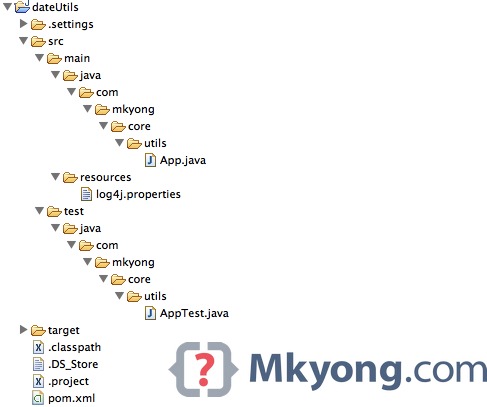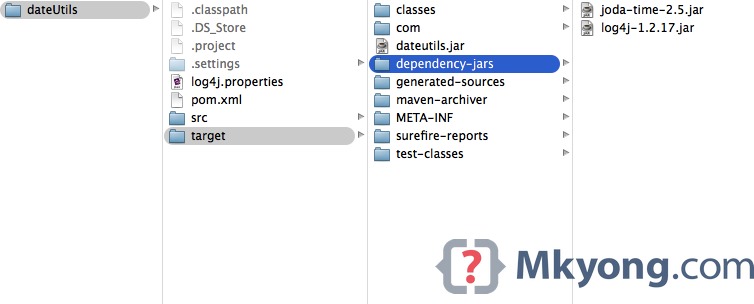How to Open a Dona Maria Mole Jar
How to create a jar file with Maven
In this tutorial, we will show you how to use Maven build tool, to create a single executable Jar, and how to deal with the project's dependencies.
Tools used :
- Maven 3.1.1
- JDK 1.7
- log4j 1.2.17
- Joda-time 2.5
- Eclipse 4.3
1. Create a simple Java project
Create a Java project from the Maven quick start template.
$ mvn archetype:generate -DgroupId=com.mkyong.core.utils -DartifactId=dateUtils -DarchetypeArtifactId=maven-archetype-quickstart -DinteractiveMode=false The following files and folder structure will be created.
. |____dateUtils | |____pom.xml | |____src | | |____main | | | |____java | | | | |____com | | | | | |____mkyong | | | | | | |____core | | | | | | | |____utils | | | | | | | | |____App.java | | |____test | | | |____java | | | | |____com | | | | | |____mkyong | | | | | | |____core | | | | | | | |____utils | | | | | | | | |____AppTest.java Above folder structure is not enough, create a log4j.properties file and put it in src/main/resources/log4j.properties, just create the resources folder manually.
log4j.properties
# Root logger option log4j.rootLogger=DEBUG, stdout # Direct log messages to stdout log4j.appender.stdout=org.apache.log4j.ConsoleAppender log4j.appender.stdout.layout=org.apache.log4j.PatternLayout log4j.appender.stdout.layout.ConversionPattern=%d{ABSOLUTE} %5p %c{1}:%L - %m%n Make it support Eclipse.
$ mvn eclipse:eclipse And imports the project into Eclipse IDE, the final project structure should be like this :

2. Update Pom.xml
Update pom.xml to declare both log4j and the jodatime dependencies, for output to a jar format, make sure the packaging is set to "jar". Read below comment for self-explanatory.
pom.xml
<project xmlns="http://maven.apache.org/POM/4.0.0" xmlns:xsi="http://www.w3.org/2001/XMLSchema-instance" xsi:schemaLocation="http://maven.apache.org/POM/4.0.0 http://maven.apache.org/maven-v4_0_0.xsd"> <modelVersion>4.0.0</modelVersion> <groupId>com.mkyong.core.utils</groupId> <artifactId>dateUtils</artifactId> <!-- Output to jar format --> <packaging>jar</packaging> <version>1.0-SNAPSHOT</version> <name>dateUtils</name> <url>http://maven.apache.org</url> <properties> <jdk.version>1.7</jdk.version> <jodatime.version>2.5</jodatime.version> <junit.version>4.11</junit.version> <log4j.version>1.2.17</log4j.version> </properties> <dependencies> <dependency> <groupId>junit</groupId> <artifactId>junit</artifactId> <version>${junit.version}</version> <scope>test</scope> </dependency> <dependency> <groupId>joda-time</groupId> <artifactId>joda-time</artifactId> <version>${jodatime.version}</version> </dependency> <dependency> <groupId>log4j</groupId> <artifactId>log4j</artifactId> <version>${log4j.version}</version> </dependency> </dependencies> <build> <finalName>dateutils</finalName> <plugins> <!-- download source code in Eclipse, best practice --> <plugin> <groupId>org.apache.maven.plugins</groupId> <artifactId>maven-eclipse-plugin</artifactId> <version>2.9</version> <configuration> <downloadSources>true</downloadSources> <downloadJavadocs>false</downloadJavadocs> </configuration> </plugin> <!-- Set a JDK compiler level --> <plugin> <groupId>org.apache.maven.plugins</groupId> <artifactId>maven-compiler-plugin</artifactId> <version>2.3.2</version> <configuration> <source>${jdk.version}</source> <target>${jdk.version}</target> </configuration> </plugin> <!-- Make this jar executable --> <plugin> <groupId>org.apache.maven.plugins</groupId> <artifactId>maven-jar-plugin</artifactId> <configuration> <!-- DO NOT include log4j.properties file in your Jar --> <excludes> <exclude>**/log4j.properties</exclude> </excludes> <archive> <manifest> <!-- Jar file entry point --> <mainClass>com.mkyong.core.utils.App</mainClass> </manifest> </archive> </configuration> </plugin> </plugins> </build> </project> 3. Update App.java
Update the generated App.java with the following content :
App.java
package com.mkyong.core.utils; import org.apache.log4j.Logger; import org.joda.time.LocalDate; public class App { private static final Logger logger = Logger.getLogger(App.class); public static void main(String[] args) { System.out.println(getLocalCurrentDate()); } private static String getLocalCurrentDate() { if (logger.isDebugEnabled()) { logger.debug("getLocalCurrentDate() is executed!"); } LocalDate date = new LocalDate(); return date.toString(); } } Now, this project has two dependencies : log4j and jodatime.
4. Working with Dependencies
4.1. How can I add dependencies in a jar?
– You can put both log4j.jar and jodatime.jar inside the final.jar, but your classes are unable to call other classes which is inside the unpack log4j.jar, Java jar is designed like this, unless you create a special class loader like one-jar plugin.
– Alternatively, use maven-assembly-plugin to extract all dependency jars into raw classes, and group it together. Read this StackOverflow thread. This hack is workable in project with less dependencies only, for large project with many dependencies, it will cause Java class name conflict issue.
– Try one-jar plugin, it will create a fat-jar, which includes the entire project's dependencies into a single jar file, read this article – Create a fat Jar file with Maven
4.2 Solution
The one-jar solution is really good, but I don't like the custom class loader and fat-jar concept. My simplest and always working solution is copy the entire project's dependencies to a pre-defined folder, and define the dependency classpath in the jar's manifest file.
Below is the updated and final pom.xml, to use maven-dependency-plugin to copy all dependencies to target/dependency-jars/ folder, and use maven-jar-plugin to add the dependency classpath.
pom.xml
<project xmlns="http://maven.apache.org/POM/4.0.0" xmlns:xsi="http://www.w3.org/2001/XMLSchema-instance" xsi:schemaLocation="http://maven.apache.org/POM/4.0.0 http://maven.apache.org/maven-v4_0_0.xsd"> <modelVersion>4.0.0</modelVersion> <groupId>com.mkyong.core.utils</groupId> <artifactId>dateUtils</artifactId> <packaging>jar</packaging> <version>1.0-SNAPSHOT</version> <name>dateUtils</name> <url>http://maven.apache.org</url> <properties> <jdk.version>1.7</jdk.version> <jodatime.version>2.5</jodatime.version> <junit.version>4.11</junit.version> <log4j.version>1.2.17</log4j.version> </properties> <dependencies> <dependency> <groupId>junit</groupId> <artifactId>junit</artifactId> <version>${junit.version}</version> <scope>test</scope> </dependency> <dependency> <groupId>joda-time</groupId> <artifactId>joda-time</artifactId> <version>${jodatime.version}</version> </dependency> <dependency> <groupId>log4j</groupId> <artifactId>log4j</artifactId> <version>${log4j.version}</version> </dependency> </dependencies> <build> <finalName>dateutils</finalName> <plugins> <!-- download source code in Eclipse, best practice --> <plugin> <groupId>org.apache.maven.plugins</groupId> <artifactId>maven-eclipse-plugin</artifactId> <version>2.9</version> <configuration> <downloadSources>true</downloadSources> <downloadJavadocs>false</downloadJavadocs> </configuration> </plugin> <!-- Set a compiler level --> <plugin> <groupId>org.apache.maven.plugins</groupId> <artifactId>maven-compiler-plugin</artifactId> <version>2.3.2</version> <configuration> <source>${jdk.version}</source> <target>${jdk.version}</target> </configuration> </plugin> <!-- Make this jar executable --> <plugin> <groupId>org.apache.maven.plugins</groupId> <artifactId>maven-jar-plugin</artifactId> <configuration> <excludes> <exclude>**/log4j.properties</exclude> </excludes> <archive> <manifest> <addClasspath>true</addClasspath> <mainClass>com.mkyong.core.utils.App</mainClass> <classpathPrefix>dependency-jars/</classpathPrefix> </manifest> </archive> </configuration> </plugin> <!-- Copy project dependency --> <plugin> <groupId>org.apache.maven.plugins</groupId> <artifactId>maven-dependency-plugin</artifactId> <version>2.5.1</version> <executions> <execution> <id>copy-dependencies</id> <phase>package</phase> <goals> <goal>copy-dependencies</goal> </goals> <configuration> <!-- exclude junit, we need runtime dependency only --> <includeScope>runtime</includeScope> <outputDirectory>${project.build.directory}/dependency-jars/</outputDirectory> </configuration> </execution> </executions> </plugin> </plugins> </build> </project> 5.The final Jar file
5.1 Package the project.
$ mvn package Review the folder structure in the target folder

A dateutils.jar is created, and the entire project runtime dependencies (excluded junit) are copied to target/dependency-jars/ folder.
5.2 List out the dateutils.jar content :
$ jar tf target/dateutils.jar META-INF/ META-INF/MANIFEST.MF com/ com/mkyong/ com/mkyong/core/ com/mkyong/core/utils/ com/mkyong/core/utils/App.class META-INF/maven/ META-INF/maven/com.mkyong.core.utils/ META-INF/maven/com.mkyong.core.utils/dateUtils/ META-INF/maven/com.mkyong.core.utils/dateUtils/pom.xml META-INF/maven/com.mkyong.core.utils/dateUtils/pom.properties 5.3 Extracts and review the content of MANIFEST.MF, the dependencies are added in the Class-Path.
META_INF/MANIFEST.MF
Manifest-Version: 1.0 Built-By: mkyong Build-Jdk: 1.7.0_05 Class-Path: dependency-jars/joda-time-2.5.jar dependency-jars/log4j-1.2.17.jar Created-By: Apache Maven 3.1.1 Main-Class: com.mkyong.core.utils.App Archiver-Version: Plexus Archiver 5.4 Run it
$ java -jar target/dateutils.jar log4j:WARN No appenders could be found for logger (com.mkyong.core.utils.App). log4j:WARN Please initialize the log4j system properly. log4j:WARN See http://logging.apache.org/log4j/1.2/faq.html#noconfig for more info. 2014-10-19 Oppss…
5.5 Where is log4j.properties?
This is a GOOD practice to exclude the log4j.properties in the jar file, to avoid issues like multiple log4j.properties files in classpath.
You can still pass in the log4j properties via the log4j.configuration system property like this :
$ java -jar -Dlog4j.configuration=file:/full_path/log4j.properties target/dateutils.jar 17:09:15,385 DEBUG App:18 - getLocalCurrentDate() is executed! 2014-10-19 Note
In future, if you want to move dateUtils.jar, make sure to copy its dependency-jars folder as well. If you have a better idea, do share with me, thanks.
Done.
Download Source Code
References
- dependency:copy-dependencies
- Maven-archetype-plugin official page.
- How to make an executable jar file
- One-JAR
- Maven – Exclude log4j.properties in Jar file
- Maven – Create a fat Jar file – One-JAR example
Comments
How to Open a Dona Maria Mole Jar
Source: https://mkyong.com/maven/how-to-create-a-jar-file-with-maven/
0 Response to "How to Open a Dona Maria Mole Jar"
Post a Comment